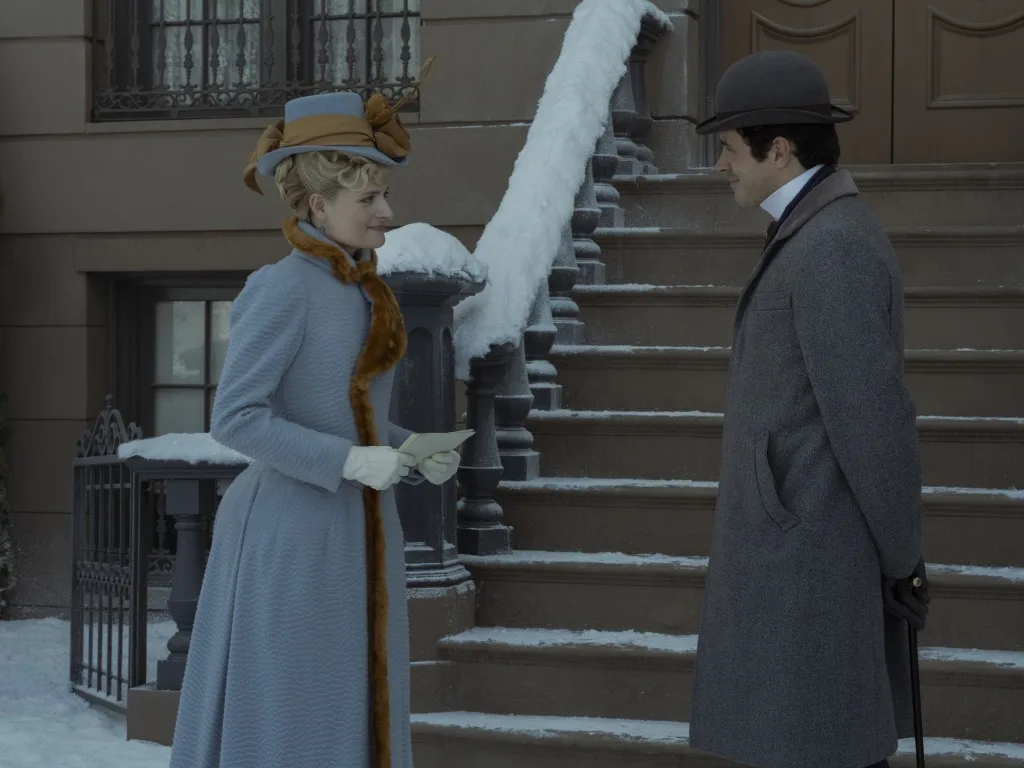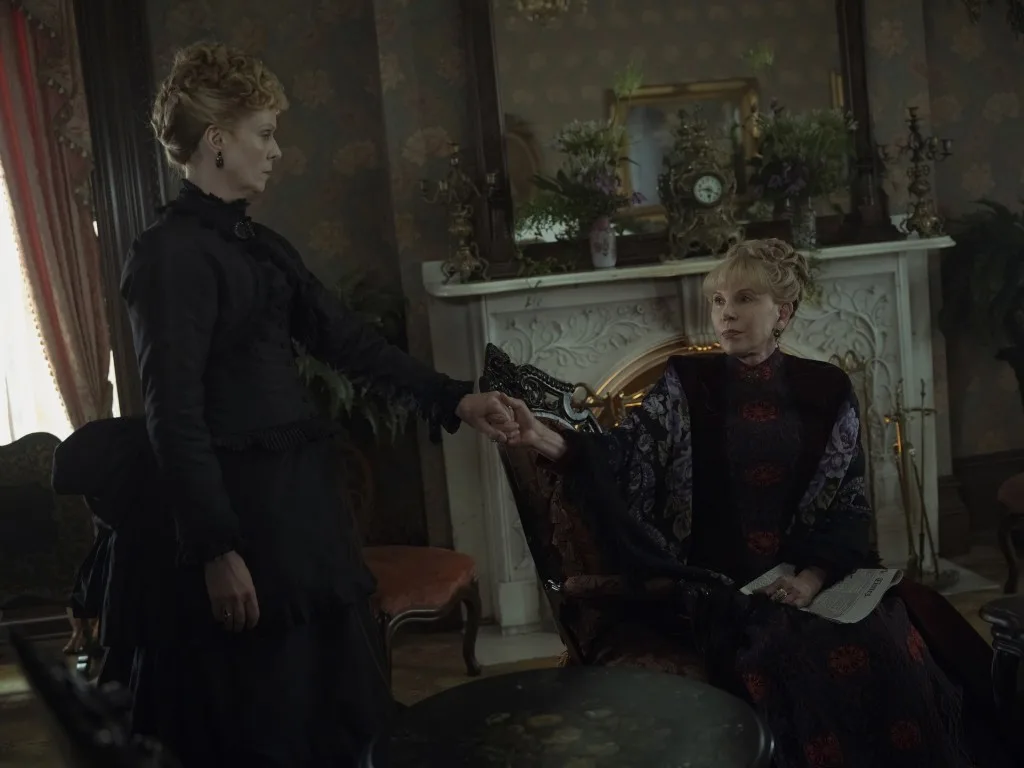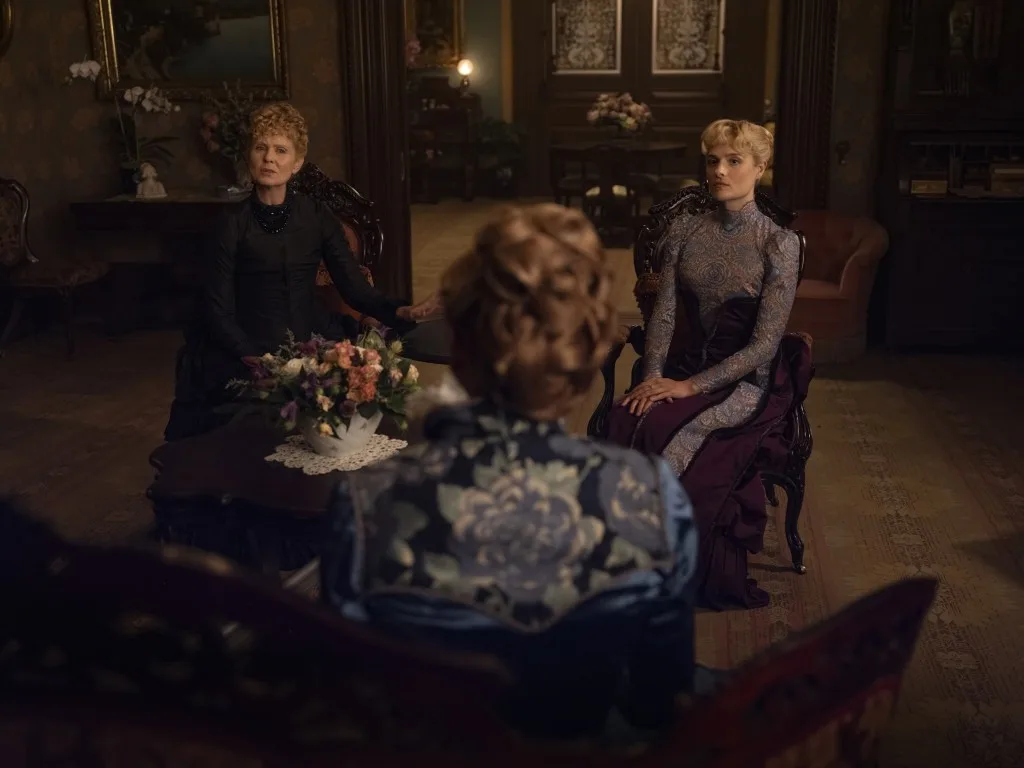In the final episode of the second season of HBO’s “The Gilded Age,” the van Rhijn family almost lost everything. The victim of an elaborate scam, Oscar (Blake Ritson) lost most of the family’s money, leaving his mother Agnes (Christine Baranski) fearful that the family would have to sell their belongings and move out of the glorious society she helped build. But, they were spared at the last minute by the money that her sister Ada’s (Cynthia Nixon) late husband Luke Forte (Robert Sean Leonard) left for her, introducing a shift in the family’s dynamics. Despite this, a tight-knit bow was wrapped around the season’s major conflict, as often happens with the major players of this soapy series.
Season 3 immediately begins to untie this bow, with Agnes and Ada facing off as two women grappling for power in their own home. Across the street, Bertha (Carrie Coon) is reaching for more power than she already has as the affluent Mrs. Russel, trying and at times failing, to control her daughter Gladys’ (Taissa Farmiga) romantic prospects. Determined for her daughter to take her rightful place in society by the side of Hector, Duke of Buckingham (Ben Lamb), Bertha begins to constrict herself and her family to the point of no return. By her side, her husband George (Morgan Spector) is attempting to build a cross-country railroad, despite a looming recession taking the banks and stocks by storm. Although they believe their separate aspirations to be for the betterment of their families, their egos stand in the way of any true sense.

Julian Fellowes’ “Downton Abbey” followup has always been an entertaining albeit airy drama, Season 3 slowly morphs into a thrilling series where power shifts threaten each of these characters and their places in society. As each character attempts to climb varying ladders of success—whether that be romantic prospects, business ventures, or personal transformations—they change before our eyes into people that by the end of the season, no longer mirror the ones we were introduced to in Season 1. As each relationship changes over the course of 8 episodes, it’s clear that “The Gilded Age” is finally taking a step forward, even if some of its characters appear desperate to stay stagnant. Monologues are given that rival the series’ previously light dialogue, and jabs are traded back-and-forth at a breakneck pace.
“Winning in business and winning in society are linked,” Bertha tells her husband during one of their many arguments this season. The line is shrilly delivered by a magnificent Carrie Coon, who continues to imbue a real frailty into a character that if performed by another actor, may feel quite trite. Instead, Coon and the writers weave Bertha into one of the most interesting characters on screen this year, a testament to how this show continues to excel beyond its soapy genre bounds. With Coon, Spector plays George with a frenzied arrogance this season as he continues to stretch himself thin in his business endeavors, giving him tunnel vision that he becomes consumed by.
Each time these two share the screen, their chemistry bursts forth with a magnetization we don’t often see between modern on-screen couples. While “The Gilded Age” often plays it safe in the ways in which it shows desire and sexuality, Coon and Spector radiate a heat between them that makes this sexlessness unapparent. They circle each other with a heady feverancy, only to leave each other’s rooms more frustrated than when they entered. The saccharine veil that was once cloaked these characters has finally been pulled back, as strides are made to explore their faults, tackling certain themes with an unabashedness that this series previously didn’t seem capable of.

With Season 3, it is apparent that this show is transforming into a series that is not afraid to challenge its viewers. More than ever the characters are forced to reckon with the politics that exist within the bubble of high society, even though many of them attempt to shield themselves from the truths that they long ago buried under their money and gowns. At the heart of this season are two storylines; one focusing on Peggy Scott (Denée Benton) and one which focuses on Oscar van Rhijn. Here, the show begins to address colourism and queerness not only within polite society, but within the intimate communities these two characters have crafted for themselves. The examination of these themes and the way the show challenges certain ideals is at times staggering in a show that often feels servile, yet it is a change that is welcomed, and needed for the show to prove itself bolder than its peers.
It has often felt like “The Gilded Age” was comfortable staying within the confines of its cloying cocoon, and while that’s not necessarily a bad thing, the seriousness of this season has transformed the show for good. It’s an undeniable series best, one which allows its actors the grace of consuming witty material, transforming it into biting commentary on wealth, community and desire as it flows out of their mouths. The scheming and politics that these characters partake in finally have some weighty consequences not only for themselves, but for how the show will proceed if a fourth season is greenlit. Festering under each decision and desire lays an air of destruction that when it finally comes, threatens the lives these men and women have built for themselves, and leaves their futures hanging in the balance.
All episodes were screened for review.












